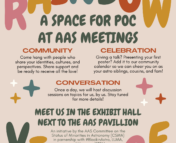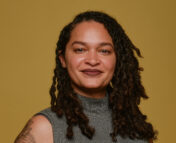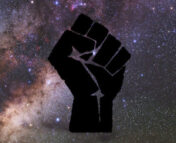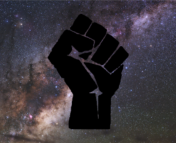This post is part of a series advertising the newly-formed Rainbow Village. The Rainbow Village is a gathering space centered in supporting, celebrating, and building community with people of color at AAS meetings. The space is designed for folks to connect with each other, share and celebrate milestones at the AAS meeting, and grow together through exploratory salon-style discussions. For a broader overview of the Rainbow Village and the organizations working to create this space, see our introduction post. Today we interview Dra. Nicole Cabrera Salazar, co-chair of AAS CSMA and CEO and founder of Movement Consulting.
”It’s a labor of love and I wanted to leave behind a legacy that people could enjoy for years to come.”
– Dra. Nicole Cabrera Salazar
Who is Doctora Nicole?
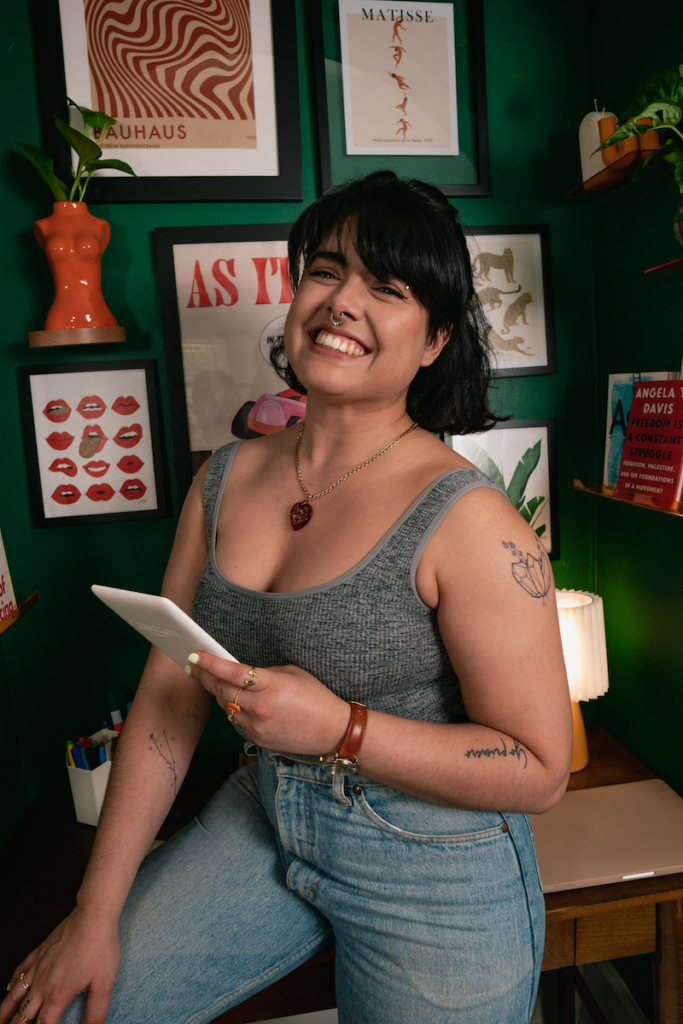
Dra. Nicole Cabrera Salazar is the CEO and founder of Movement Consulting, a consulting collective that provides immersive learning experiences to bring awareness to systems of oppression, as well as the co-chair of the AAS Committee on the Status of Minorities in Astronomy (CSMA). Dra. Nicole began her education at a community college, which she highlights as the best education they received in their career. She also had a supportive undergraduate experience, which led her into the field of astronomy in her junior year of college. During her PhD training, Dra. Nicole experienced systemic barriers that she noticed others in her program were not experiencing. At the time, she was considering becoming a science communicator centering people of color, but quickly realized she needed to learn more about experiences aside from her own identity as a Latina. Taking a Race and Ethnic Relations course during her graduate studies contextualized her experience and inspired her to enroll in other sociology courses.
In her 4th year of grad school, Dra. Nicole was nominated by her career counselor to give a TEDx Talk on her research, but she instead took this opportunity to speak about diversity and inclusion in STEM. This experience combined with what she learned in sociology classes helped her realize a new career path. Shortly after she received her doctorate, she founded Movement Consulting, a consulting collective that focuses on building radically nourishing spaces in STEM fields.
“This is what I want to do. I want to support people of color and change the culture of astronomy and STEM.”
– Dra. Nicole Cabrera Salazar
Dra. Nicole has served on the AAS Committee on the Status of Minorities (CSMA) as a member since 2016, and as co-chair for the last few years. In 2019, Dra. Nicole joined the AAS Site Visit Oversight Committee (SVOC) as a co-chair, helping to establish a protocol for the AAS Site Visit Program to report on the climate of astronomy departments on behalf of the AAS. Seeing the need to have people of color represented in these spaces, she successfully advocated for KeShawn Ivory, an undergraduate student at the time, to join the AAS Site Visit Oversight Committee. Setting this precedent allowed Dra. Nicole to advocate for the AAS to allow undergraduate and graduate students to serve in the AAS Committee on the Status of Minorities in Astronomy (CSMA) as well.
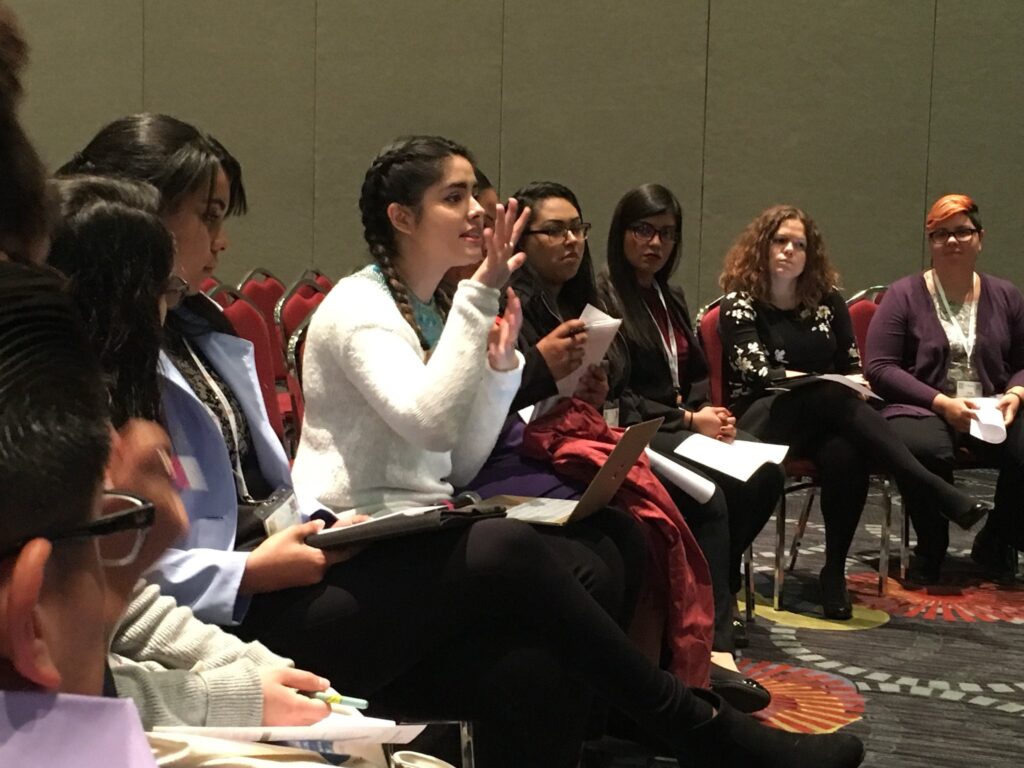
What is the AAS Committee on the Status of Minorities in Astronomy (CSMA)?
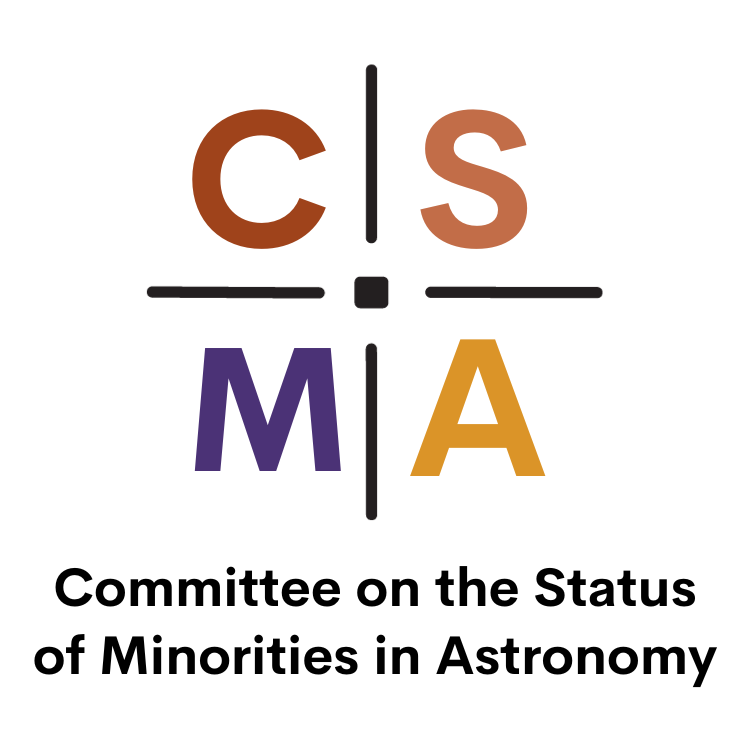
The AAS Committee on the Status of Minorities in Astronomy (CSMA) is a committee of the American Astronomical Society dedicated to enhancing the participation of underrepresented minorities in astronomy at all levels of experience. The CSMA accomplishes its mission through a variety of initiatives that benefit people of color based on their needs. All committee members have the opportunity to design new initiatives that they feel are important to the community. Some CSMA activities and initiatives include:
- Attending the SACNAS National Diversity in STEM Conference as an exhibitor, hosting sessions at the conference and supporting people of color.
- Attending the National Society of Black Physicists annual conference as an exhibitor and granting speakers the Beth Brown Award.
- Establishing the CSMA Micro-Grants Program, an initiative by Carlos Vargas that provides one time grants of at least $500 to support BIPOC undergraduates in various ways including but not limited to applying to graduate schools, conference registrations, and buying textbooks.
- Hosting the AAS Town Hall on Racism = Prejudice + Power: A Discussion of Racism in the Field of Astronomy in January 2017, led by Prof. Jorge Moreno, Dra. Nicole Cabrera Salazar, and Prof. Adam Burgasser
- Hosting a AAS Virtual Town Hall on Anti-Blackness in Astronomy after the murder of George Floyd, led by Nicole Cabrera Salazar
- Hosting a blog to celebrate astronomers of color and acknowledge current events that disproportionately affect people of color.
- Hosting a meet and greet at AAS meetings where people of color can gather and network with each other (Join the CSMA for their meet and greet on Wednesday, January 10th at 6 pm CT at Baroness on Baronne!)
- Host various sessions and panels at AAS meetings, for example:
- #AbolishQuals: Barriers to Success for Graduate Students of Color in Astronomy at the 241st AAS Meeting (Led by Nicole Cabrera Salazar)
- Astronomy’s Poverty Problem at the upcoming 243rd AAS meeting (Led by Carlos Vargas)
- Host Effective Partnerships with HBCUs in Astronomy at the upcoming 243rd AAS meeting (Led by Ashley Walker)
- Co-hosting the Rainbow Village at AAS.
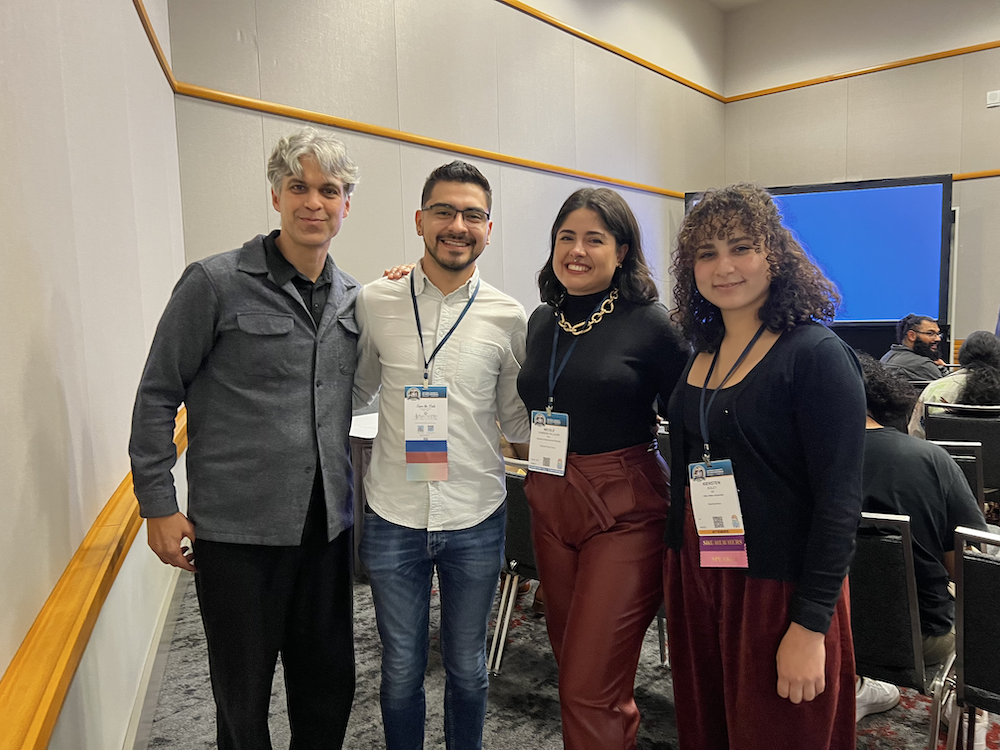
The CSMA is the only AAS committee composed entirely of people of color. After the murder of George Floyd and the onset of the pandemic, Nicole advocated for CSMA members to take a step back to process these difficult times while still serving on the committee. Dra. Nicole has been a fierce advocate for people of color at institutions and professional societies like the AAS. Through both her company and volunteer work such as the CSMA, she has helped pave the way for people of color to feel empowered in scientific spaces.
The Rainbow Village
In her final year on the CSMA, Dra. Nicole noticed that if any astronomers of color were not able to attend the CSMA Meet & Greet, they would miss out on an opportunity to find community and support at the AAS meeting and beyond. Hence, she created the Rainbow Village, a furnished booth space in the exhibitor hall where people of color and allies can gather throughout the entire conference. The Rainbow Village is a collaboration between AAS CSMA, VanguardSTEM, LUMA and #BlackinAstro. See more in our introduction post on the Rainbow Village.
The Rainbow Village will host community discussions on various topics each day of the conference. Dra. Nicole will be leading a discussion on “Academic Fucksh!t” on Wednesday, January 10th at 1 pm at the Rainbow Village in the exhibitor hall. She invites everyone to join!
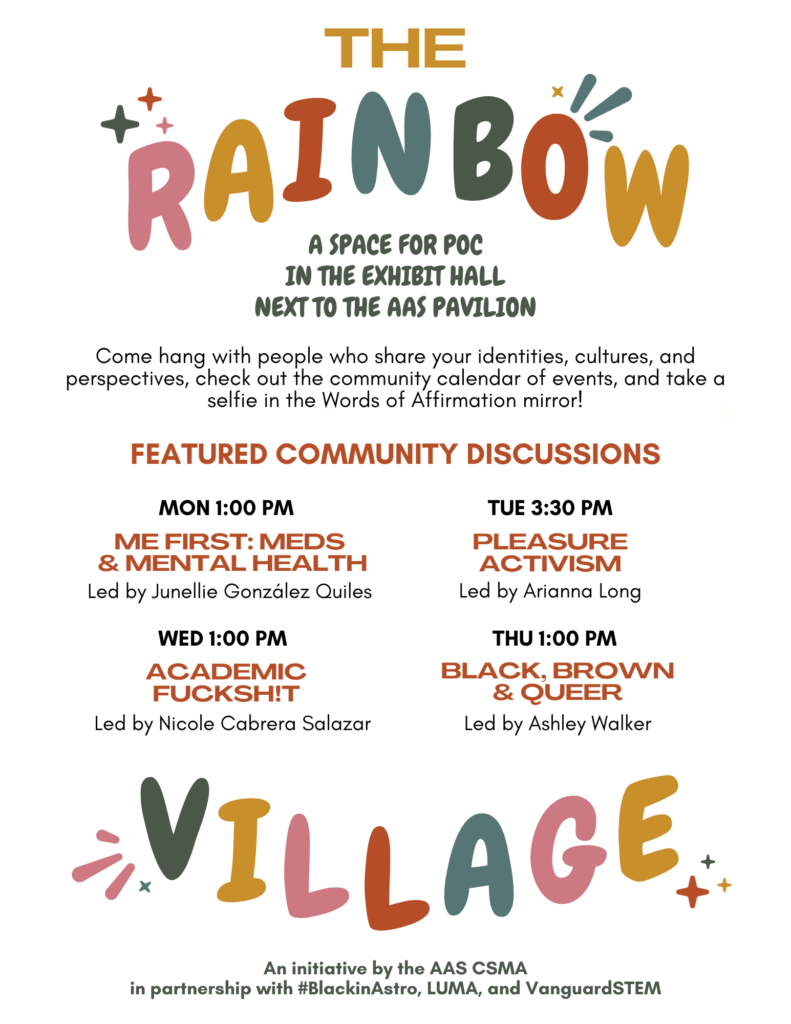
How can I get involved with AAS CSMA and the Rainbow Village?
To learn more about the AAS CSMA, follow them on X (formerly Twitter) at @AAS_CSMA for announcements. If you are interested, sign up to be a volunteer for the AAS CSMA on the AAS website. For the upcoming AAS meeting in January 2024, you can fill out this Rainbow Village volunteer form if you would like to support as well.
What is Movement Consulting?
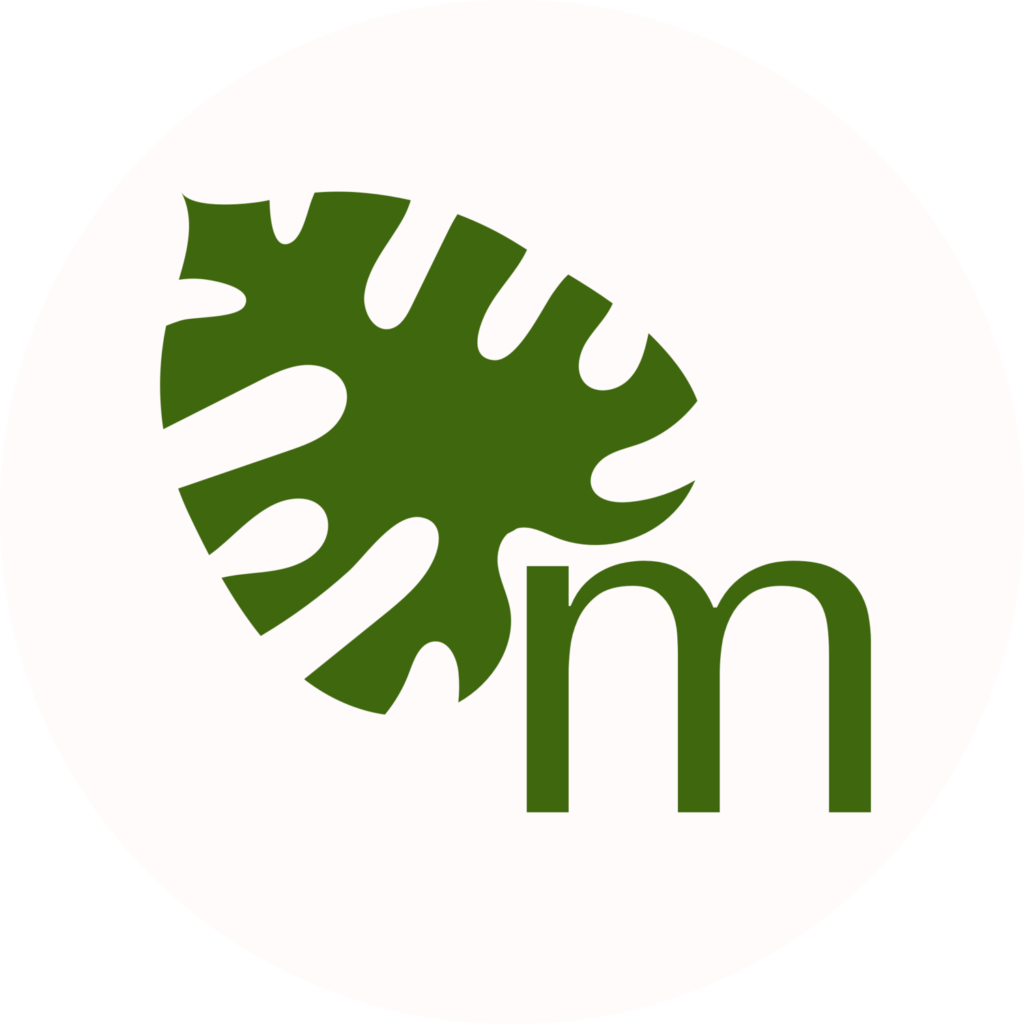
Movement Consulting offers training for faculty and professionals in scientific spaces, empowerment workshops for marginalized people, and strategic equity and inclusion consulting. This three-pronged approach helps to ensure that both people in power as well as marginalized people have the tools to navigate and catalyze change in their fields.
In the near future, they hope to offer a summer internship similar to REU programs for undergraduate students, but focused on teaching students the tools and skills to create sustainable change in STEM. Dra. Nicole highlights that there is no training currently available for social justice advocacy in the sciences, and she wants Movement Consulting to be a training ground for marginalized people in STEM who want to make academic and scientific spaces equitable and just for everyone.
If you want to learn more, please visit Movement’s website as well as their X (previously Twitter) and Instagram pages for more information! If you’re an academic who wants to help create a more nourishing environment for all, Movement also offers a course titled “From Intent to Impact: A 13 Week Course to Foster Genuine Relation in Academia through Mentorship” in addition to workshops about many important topics. Dra. Nicole also hosts a podcast titled “The Daily Radical: A Social Justice Podcast”.
Astrobite edited by Yoni Brande
Featured image credit: AAS CSMA

